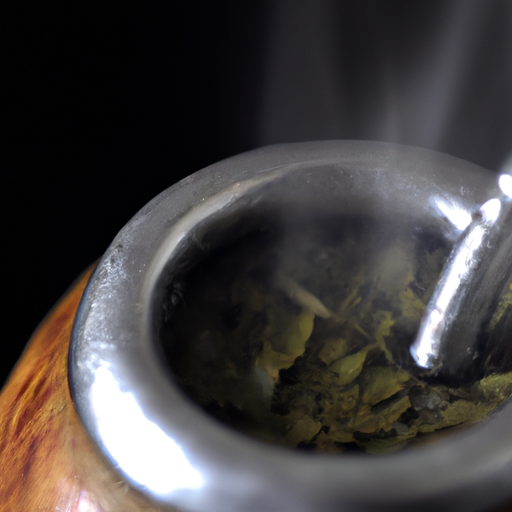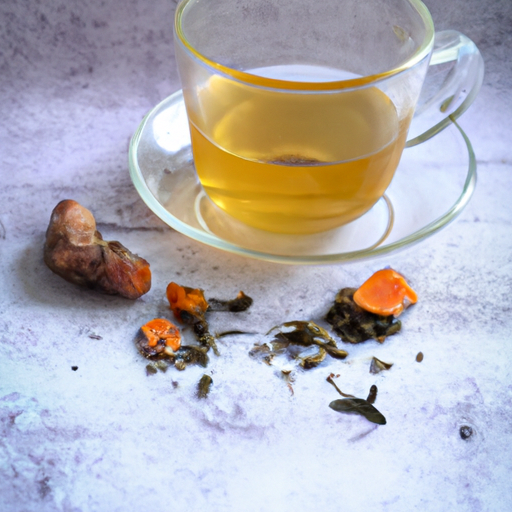I had never realized the immense impact a simple cup of tea could have until I came across ginger peach turmeric tea. This isn’t just a regular tea; it’s a combination of three elements with the potential to greatly benefit the body.
The combination of ginger, peach, and turmeric is unique and offers numerous health benefits.
When I first heard about this tea, I imagined it to have an odd taste and smell. However, after trying it out myself, I was pleasantly surprised by how delicious it was. Not only did it have a comforting aroma, but it also had a subtle sweetness from the peach that balanced well with the spiciness of ginger and earthy flavor of turmeric.
Plus, knowing all the health benefits that come with drinking this tea made me appreciate it even more. In this article, we’ll dive deeper into what exactly ginger peach turmeric tea can help with and how to make it yourself.
Key Takeaways
- Ginger Peach Turmeric Tea contains powerful anti-inflammatory compounds that can reduce inflammation and protect against cellular damage caused by oxidative stress.
- It can alleviate symptoms associated with irritable bowel syndrome (IBS), reduce nausea and vomiting, aid in digestion, and boost the immune response.
- The tea can also enhance brain function, protect against brain damage caused by free radicals, and reduce inflammation and hyperpigmentation on the skin.
- However, individuals with potential allergies or medical conditions that may interact negatively with the herbs should consult with a healthcare professional before adding the tea to their daily routine.
What is Ginger Peach Turmeric Tea?
You’re going to love this flavorful tea that combines the spicy kick of ginger, the sweetness of peach, and the healing benefits of turmeric for a delicious and healthy beverage. Ginger Peach Turmeric Tea is an herbal tea made from dried ginger root, dried peaches, and turmeric powder.
The tea has a rich golden color with a sweet aroma and a spicy taste.
The Benefits of Ginger Peach Turmeric Tea are numerous. Ginger is known to reduce inflammation in the body while also helping with digestion. Peaches contain vitamins A and C which help boost immunity and keep skin healthy. Turmeric contains curcumin which has powerful anti-inflammatory properties that can help with joint pain and arthritis.
In terms of Taste Profile, Ginger Peach Turmeric Tea is both sweet and spicy. The combination of ginger and peach creates a unique flavor profile that is both soothing and refreshing. And when combined with turmeric, it becomes an even more potent drink that not only tastes great but also provides multiple health benefits for your body.
With all these benefits in mind, let’s delve into how this tea helps relieve inflammation in the body without delay!
Anti-Inflammatory Properties
Sipping on ginger peach turmeric tea can soothe inflammation, calm your body, and ease discomfort. Ginger and turmeric are two powerful anti-inflammatory agents that have been used for centuries to reduce inflammation in the body.
Ginger contains compounds called gingerols which have potent anti-inflammatory effects while curcumin, the active ingredient in turmeric, is a natural remedy that has been proven to be as effective as some prescription drugs. Reducing inflammation is crucial for maintaining good health because it plays a key role in many chronic diseases such as heart disease, cancer, and diabetes.
Inflammation becomes problematic when it becomes chronic because it can damage healthy tissues and lead to various health problems. Consuming ginger peach turmeric tea regularly can help keep inflammation under control by reducing the production of inflammatory molecules in the body.
Drinking ginger peach turmeric tea can be an excellent way to naturally combat inflammation in the body. It’s a safe and effective way to incorporate these potent anti-inflammatory agents into your diet without resorting to prescription drugs or other harsh treatments.
Next up, let’s take a look at how this delicious tea can help with joint pain and arthritis.
Joint Pain and Arthritis
If you suffer from joint pain or arthritis, incorporating ginger peach turmeric tea into your daily routine may provide relief and improve mobility. This is because ginger and turmeric are natural remedies that have anti-inflammatory properties, which can help reduce swelling and pain in joints.
Additionally, drinking this tea regularly can support the body’s immune system, helping to prevent further damage caused by chronic inflammation.
Here are four reasons why ginger peach turmeric tea may help with joint pain and arthritis:
- Ginger is a natural painkiller that can help alleviate soreness in the joints.
- Turmeric contains curcumin, a compound that has been shown to reduce inflammation in the body.
- The antioxidants found in peaches can help protect against cellular damage caused by oxidative stress.
- Drinking tea regularly can be part of an overall healthy lifestyle that includes exercise routines designed to strengthen muscles around the affected joints.
Incorporating these natural remedies into your daily routine can be a great way to manage joint pain and arthritis without relying solely on medication. However, it’s important to consult with your healthcare provider before making any significant changes to your treatment plan. In the next section, we’ll discuss how ginger peach turmeric tea can also benefit digestive health.
Digestive Health
Improving digestive health is vital for overall wellness, and incorporating ginger peach turmeric tea into your daily routine can work wonders – it’s like a magic potion for your gut!
The combination of ginger, peach, and turmeric provides numerous benefits to the digestive system. Ginger has been shown to reduce nausea and vomiting, while peach contains fiber that aids in digestion. Turmeric has anti-inflammatory properties that can alleviate symptoms associated with irritable bowel syndrome (IBS).
If you’re looking for healthy recipes or herbal supplements to improve your digestive health, look no further than ginger peach turmeric tea. It’s easy to make at home and can be enjoyed hot or cold. You can also add honey or lemon for extra flavor and nutritional benefits.
Additionally, incorporating herbal supplements like slippery elm or peppermint oil may also help soothe the digestive tract.
Incorporating ginger peach turmeric tea into your daily routine not only improves digestive health but also supports immune system function. The antioxidants found in both ginger and turmeric have been shown to boost immunity by fighting off harmful free radicals that cause inflammation throughout the body.
So why not give this delicious and nutritious tea a try? Your gut (and immune system) will thank you!
Immune System Support
I’m excited to share with you about the immune system support benefits of ginger peach turmeric tea. This tea contains powerful antioxidants that can help protect your body from free radicals, which are harmful molecules that contribute to many diseases.
Additionally, studies have shown that the ingredients in this tea can boost your immune response and help fight off infections. So, if you’re looking for a delicious way to support your immune system, consider incorporating ginger peach turmeric tea into your daily routine!
Antioxidant Properties
You’ll love the antioxidant properties of ginger peach turmeric tea, which can help protect your body from harmful free radicals. Antioxidants are compounds that prevent or slow down damage to cells caused by oxidative stress, a process that occurs naturally in the body but can be exacerbated by environmental factors like pollution and poor diet. By neutralizing free radicals before they cause harm, antioxidants may provide a wide range of health benefits beyond reducing inflammation – including improvements in heart health, brain function, and skin appearance.
To illustrate the power of antioxidants in ginger peach turmeric tea, consider this table:
| Food/Drink | Antioxidant Capacity (ORAC units per 100g) |
|---|---|
| Ginger Peach Turmeric Tea | 1270 |
| Blueberries | 4669 |
| Dark Chocolate | 20800 |
| Pecans | 17940 |
| Kidney Beans | 8190 |
As you can see, ginger peach turmeric tea doesn’t have the highest antioxidant capacity compared to some other foods. However, it is still a valuable source of these important compounds and can offer significant health benefits when consumed regularly as part of a balanced diet. With its delicious flavor profile and potential wellness perks, this tea is definitely worth incorporating into your routine for overall immune system support.
Boosts Immune Response
Boosting your immune response is another benefit of regularly drinking ginger peach turmeric tea. Research has shown that the polyphenols in tea can increase the activity of white blood cells by up to five times, which can help protect against illnesses and infections. Additionally, ginger has anti-inflammatory properties that can also support a healthy immune system.
Drinking 2-3 cups of ginger peach turmeric tea per day may enhance immune function. However, it is important to note that excessive caffeine consumption may have negative effects on immune function, so it is recommended to choose decaffeinated versions of this tea. As with any supplement or dietary change, it’s best to consult with a healthcare professional before incorporating ginger peach turmeric tea into your daily routine.
Scientific research has found that consuming green tea polyphenols increased the activity of natural killer cells by up to five times, indicating an enhanced immune response. Ginger has also been shown in multiple studies to possess antimicrobial and anti-inflammatory properties that may support overall immune health. Turmeric contains curcumin, which has been found in animal studies to enhance antibody responses and promote overall immunity.
It’s important to note how interconnected our body’s systems are. The same compounds found in ginger peach turmeric tea that support a healthy immune system may also play a role in cognitive function and mood regulation.
Brain Function
Improve your cognitive abilities with ginger peach turmeric tea, as it enhances brain function and promotes mental clarity. The combination of these three ingredients has been found to support brain health by reducing inflammation and oxidative stress.
Turmeric contains a compound called curcumin, which has anti-inflammatory properties that may help improve cognitive function in older adults. Peaches are also rich in antioxidants, such as vitamin C and beta-carotene, which can protect the brain from damage caused by free radicals.
Ginger is another powerful ingredient that has been shown to improve cognitive function by increasing blood flow to the brain. It contains compounds called gingerols and shogaols that have neuroprotective effects.
Incorporating ginger peach turmeric tea into your daily routine may help boost your cognitive performance and promote mental clarity. Stay tuned for how to make this flavorful tea at home!
How to Make Ginger Peach Turmeric Tea
To whip up a delicious batch of ginger peach turmeric tea, all you need are a few simple ingredients and a bit of patience. Here’s how I make mine:
- Boil 2 cups of water in a saucepan.
- Add 1 tablespoon grated fresh ginger, 1 sliced peach, and 1 teaspoon ground turmeric to the boiling water.
- Reduce heat and let simmer for 10 minutes.
- Strain mixture into a teapot or mug.
Ginger peach tea variations can be made by adding different fruits or spices. Some popular additions include lemon, honey, cinnamon, and cardamom. Experiment with these flavors to find your perfect cup!
While ginger peach turmeric tea has many health benefits on its own, it’s worth exploring the potential benefits of other tea blends as well. For example, green tea is rich in antioxidants that promote brain function and may reduce the risk of certain cancers. Chamomile tea is known for its calming effect on the body and can help with sleep issues.
When making any kind of herbal tea blend, it’s important to consider any cautions or allergies you may have. Always consult with your doctor before drinking new teas if you have any medical conditions or are taking any medications that could interact negatively with certain herbs. With a little mindfulness and experimentation, you can create delicious and beneficial herbal teas that fit your unique needs! Moving on to cautions and considerations…
Cautions and Considerations
Before you start experimenting with herbal tea blends, it’s important to consider any potential allergies or medical conditions that could interact negatively with certain herbs. While ginger peach turmeric tea is generally safe for most people, there are a few safety precautions and potential side effects to keep in mind.
Firstly, turmeric can thin the blood and increase the risk of bleeding. Individuals taking blood-thinning medication or who have bleeding disorders should avoid consuming large amounts of turmeric.
Additionally, ginger can lower blood sugar levels and may interact with diabetes medications. It’s important to monitor blood sugar levels closely if you have diabetes and consume ginger regularly.
Lastly, some individuals may experience stomach upset or heartburn from consuming too much ginger or turmeric. Starting with a small amount of tea and gradually increasing the dosage can help prevent these side effects.
While ginger peach turmeric tea has many potential health benefits, it’s important to be cautious when incorporating it into your diet. If you have any concerns about how this tea may affect your health, consult with a healthcare professional before adding it to your daily routine.
Now let’s move on to other ways to use ginger peach turmeric tea!
Other Ways to Use Ginger Peach Turmeric Tea
I’d like to discuss other ways to use ginger peach turmeric tea beyond its health benefits. One way is through culinary uses, such as adding it to sauces or marinades for a unique flavor profile.
Additionally, the antioxidants in this tea make it a great ingredient for DIY skin care products, helping to reduce inflammation and improve complexion.
Let’s explore these creative applications of ginger peach turmeric tea together.
Culinary Uses
You can add a refreshing twist to your homemade iced tea by using ginger peach turmeric tea, but have you ever considered using it as a marinade for chicken or fish? Ginger peach turmeric tea is not only great for drinking, but it also has potential in infused cooking.
Here are some flavor pairings that work well with this delicious tea:
- Pair with honey and soy sauce for a sweet and savory marinade.
- Use as a base for a stir-fry sauce with garlic and red pepper flakes.
- Combine with olive oil and lemon juice for a zesty salad dressing.
- Infuse into rice or quinoa while cooking to add extra flavor.
In addition to the culinary uses of ginger peach turmeric tea, there are also health benefits associated with consuming these ingredients together. Turmeric contains curcumin, which has anti-inflammatory properties, while ginger has been shown to aid in digestion and reduce nausea. Peach adds natural sweetness without added sugar, making this an excellent option for those looking for healthier alternatives to traditional marinades or sauces.
Looking beyond just the kitchen, ginger peach turmeric tea can even be used in DIY skin care routines! But first, let’s dive into the health benefits of this delightful beverage.
DIY Skin Care
Transform your skincare routine with the multi-functional benefits of using ginger peach turmeric tea as a natural and refreshing ingredient. DIY skincare has never been easier, thanks to the anti-inflammatory properties of turmeric combined with the antioxidant-rich ginger and peach.
The tea’s combination helps reduce inflammation, acne scars, and hyperpigmentation on the skin. To incorporate this into your beauty regimen, simply brew a cup of ginger peach turmeric tea and let it cool down.
Once cooled, apply it to your face using a cotton pad or spray bottle. The antioxidants will help protect your skin from harmful environmental pollutants while reducing redness and puffiness.
With regular use, you’ll notice brighter, clearer skin that glows from within – all without harsh chemicals or synthetic ingredients!
Frequently Asked Questions
Are there any potential side effects of consuming ginger peach turmeric tea?
As someone who enjoys drinking ginger peach turmeric tea, I’ve done some research on its potential risks and interactions.
While the ingredients in this tea are generally considered safe, it’s always important to be aware of any possible side effects or interactions with other medications you may be taking.
Some people may experience mild stomach upset or heartburn from consuming too much ginger, while others may have allergic reactions to certain herbs or spices in the blend.
It’s also important to follow recommended dosage guidelines and not exceed the amount suggested on the packaging.
That being said, there’ve been several studies that suggest that this tea can offer a variety of health benefits, including reducing inflammation, improving digestion, and boosting immunity.
In terms of taste and brewing methods, this tea has a pleasantly sweet and slightly spicy flavor that can be enjoyed hot or cold.
As with any herbal supplement or remedy, it’s always best to take precautions and consult with your healthcare provider before incorporating it into your routine.
Can ginger peach turmeric tea help with weight loss or management?
Weight management can be a challenging task for many of us, but incorporating ginger peach turmeric tea into your routine may help. This delicious beverage is not only refreshing but also has potential benefits for weight loss and management.
Studies suggest that the active compounds in ginger and turmeric can boost metabolism, leading to increased calorie burning and potentially aiding in weight loss efforts. Although more research is needed, incorporating this tea into a healthy diet and exercise regimen could be beneficial for those looking to manage their weight.
So why not try sipping on some ginger peach turmeric tea as a natural way to support your weight management goals? It’s like having a personal trainer by your side!
Is it safe for pregnant women or those who are breastfeeding to consume ginger peach turmeric tea?
As a healthcare provider, I’d advise pregnant women and breastfeeding mothers to exercise caution when consuming ginger peach turmeric tea. While ginger and turmeric are generally considered safe during pregnancy, excessive consumption could lead to adverse effects such as heartburn and stomach upset.
Peach flavoring in the tea is unlikely to cause any harm, but it’s important to note that herbal teas are not regulated by the FDA and may contain unknown ingredients or contaminants.
Breastfeeding mothers should also be aware that these herbs can pass through breast milk and potentially affect their babies. It’s always best to consult with a healthcare professional before incorporating any new supplements or teas into your diet during pregnancy or lactation.
How often should one consume ginger peach turmeric tea to see its benefits?
I’ve been drinking ginger peach turmeric tea for a while now, and I’ve noticed some great benefits. The frequency at which one should consume the tea depends on their health goals and concerns.
If you’re looking to boost your immune system or reduce inflammation, it’s recommended that you drink it daily. However, if you’re just looking for a tasty beverage, then once or twice a week is perfectly fine.
There are many benefits associated with drinking this tea regularly- from reducing joint pain to aiding digestion. However, as with any supplement or dietary change, there can be health risks involved.
It’s important to consult your doctor before adding ginger peach turmeric tea to your daily routine, especially if you have any pre-existing medical conditions or are taking medication that may interact negatively with the ingredients in the tea.
Are there any specific brands or types of ginger peach turmeric tea that are recommended for maximum benefits?
When it comes to ginger peach turmeric tea, there are definitely some brands that stand out for their quality and flavor. Some of the best brands I’ve tried include Yogi Tea, Traditional Medicinals, and Numi Organic Tea. Each of these companies offers a range of flavor variations that incorporate not just ginger and turmeric but also other herbs and spices for added health benefits.
As for brewing techniques, I find that steeping the tea bags in hot water for at least 5-7 minutes is ideal to release all the beneficial compounds. And when it comes to serving suggestions, adding a touch of honey or lemon can help enhance the flavors while also providing additional immune-boosting properties.
Overall, incorporating ginger peach turmeric tea into your daily routine can provide numerous health benefits including reducing inflammation, improving digestion, and boosting immunity.
Conclusion
In conclusion, ginger peach turmeric tea is a powerful drink that offers numerous health benefits. Its anti-inflammatory properties help reduce joint pain and inflammation associated with arthritis while also promoting digestive health and supporting the immune system. Additionally, it can enhance brain function and improve overall well-being.
To make this delicious tea, simply combine fresh ginger root, peach slices, turmeric powder, and hot water in a teapot or mug and let it steep for several minutes. However, it’s important to note that individuals on blood thinners should consult with their healthcare provider before consuming large amounts of turmeric.
Overall, incorporating ginger peach turmeric tea into your daily routine is an easy way to promote optimal health and wellness. So why not give it a try? Your body will thank you!










